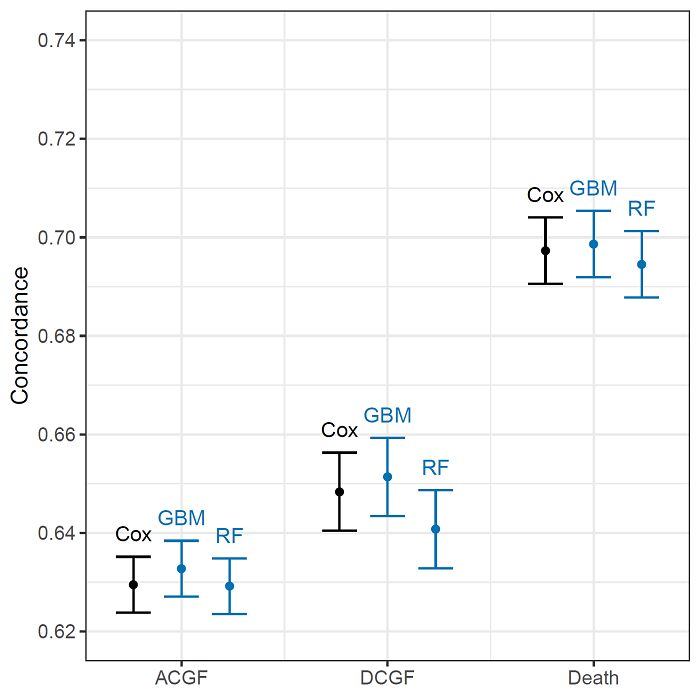Don’t Believe the Hype: Machine Learning-Based Prediction of Kidney Transplant Outcomes
Johns Hopkins University, Baltimore, MD
Meeting: 2019 American Transplant Congress
Abstract number: C64
Keywords: Prediction models
Session Information
Session Name: Poster Session C: Kidney Complications: Late Graft Failure
Session Type: Poster Session
Date: Monday, June 3, 2019
Session Time: 6:00pm-7:00pm
 Presentation Time: 6:00pm-7:00pm
Presentation Time: 6:00pm-7:00pm
Location: Hall C & D
*Purpose: Machine learning (ML) algorithms may better predict kidney transplant (KT) outcomes at the expense of model interpretability and hypothesis testing. We aimed to compare the prediction performances of popular ML algorithms versus Cox models for kidney transplant (KT) outcomes.
*Methods: Using SRTR data, we studied 133,431 adult deceased-donor kidney transplant recipients at 272 centers in 2005-2017. Centers were randomly divided into a 70% training set (190 centers; 92,559 recipients) and a 30% test set (82 centers; 40872 recipients). Using the training set, we developed prediction models for all-cause graft failure (ACGF), death-censored graft failure (DCGF), and death via Cox regressions, gradient boosting models (GBM), and random forests (RF) based on 42 clinical characteristics. Using the test set, we evaluated the prediction performances with the c-statistics.
*Results: All methods showed nearly identical prediction performances for all KT outcomes [Figure]. For ACGF, the c-statistics were 0.630 (95% CI, 0.624-0.635) for Cox model, 0.633 (0.627-0.638) for GBM, and 0.629 (0.624-0.635) for RF. For DCGF, the c-statists were 0.648 (0.640-0.656) for Cox model, 0.651 (0.643-0.659) for GBM, and 0.641 (0.633-0.649) for RF. For death, the c-statistics were 0.697 (0.691-0.704) for Cox model, 0.699 (0.692-0.705) for GBM, and 0.695 (0.688-0.701) for RF.
*Conclusions: ML algorithms showed no meaningful advantage over Cox models in predicting graft failure and death after KT. Furthermore, conventional regression modeling enables us to interpret the impact of each individual predictor and to test hypotheses, without compromising prediction performance.
To cite this abstract in AMA style:
Bae S, Segev D. Don’t Believe the Hype: Machine Learning-Based Prediction of Kidney Transplant Outcomes [abstract]. Am J Transplant. 2019; 19 (suppl 3). https://atcmeetingabstracts.com/abstract/dont-believe-the-hype-machine-learning-based-prediction-of-kidney-transplant-outcomes/. Accessed February 16, 2026.« Back to 2019 American Transplant Congress

